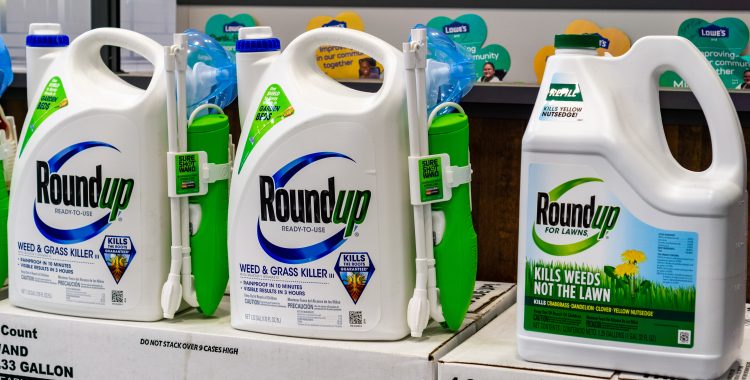Roundup Lawsuit
Whether you are a farmer, an agricultural worker, a landscaper, or simply an avid home gardener, you have probably heard of Roundup, one of the world’s most widely used herbicides. Once a go-to weed killer for residential and commercial applications, Roundup has been plagued by problems linked to its active ingredient, glyphosate. A considerable body of research has determined that glyphosate may cause cancer, most notably a cancer of the lymphatic system called non-Hodgkin’s lymphoma. The adverse health consequences that have been linked to Roundup exposure can be debilitating and long-lasting. If you have been diagnosed with non-Hodgkin’s lymphoma following exposure to Roundup weed killer, contact Robert Brown Law today to find out whether you qualify for a Roundup cancer claim. Attorney Robert Brown has the skill and expertise necessary to vigorously represent people who were exposed to Roundup and later developed non-Hodgkin’s lymphoma.
Roundup Weed Killer Linked to Non-Hodgkin’s Lymphoma
Roundup is the trade name for glyphosate, a broad-spectrum herbicide widely used across the United States to kill weeds and grasses that compete with crops on farmland and in other agricultural applications, as well as in residential lawn and garden care. Since its introduction in the 1970s, glyphosate (Roundup) has become the most heavily used weed killer in the U.S. and worldwide. In fact, Roundup use is so ubiquitous, that Monsanto developed genetically modified “Roundup Ready” crops designed to tolerate being sprayed with the weed killer, which only served to increase Roundup’s use. Although Roundup is aggressively marketed by Bayer as safe when used as directed, scientific studies have found that the weed killer may increase the risk of certain cancers, including non-Hodgkin’s lymphoma (NHL), in farmers, landscapers, agricultural workers, groundskeepers, professional gardeners, pesticide applicators, and even in homeowners who routinely use Roundup on their lawns and gardens. Roundup exposure may also affect people who live and work nearby areas where Roundup is sprayed, as a result of herbicide drift.
Lawsuits Blame Cancer Diagnoses on Roundup Exposure
As an herbicide, glyphosate works by inhibiting the action of a specific enzyme plants need to survive. However, there is a growing body of evidence indicating that glyphosate may have a carcinogenic (cancer-causing) effect on humans and animals. In fact, the World Health Organization (WHO) and the International Agency for Research on Cancer (IARC) have agreed that glyphosate is “probably carcinogenic to humans.” In response to emerging information about the potential for glyphosate in Roundup to cause cancer, thousands of Roundup lawsuits have been filed by plaintiffs who allege that they developed non-Hodgkin’s lymphoma and other serious illnesses as a result of their exposure to Roundup weed killer.
In total, more than 125,000 lawsuits have been brought against Bayer A.G. and Monsanto alleging cancer from Roundup, including nearly 100,000 claims that have reached settlement agreements with the manufacturers. The companies still face approximately 26,000 active Roundup lawsuits, including more than 4,000 claims currently pending in the Roundup multidistrict litigation (MDL) in California. When Bayer acquired Monsanto in 2018, the company took on the manufacturer’s liability for Roundup cancer claims, including any potential future claims filed by Roundup users who had not yet been diagnosed with cancer. As part of a plan to minimize future litigation risk related to glyphosate, Bayer has agreed to remove glyphosate from residential Roundup products by 2023. Still, the company denies any safety risks associated with glyphosate use and will continue to sell glyphosate products in its professional and agricultural markets.
Studies Linking Roundup to Non-Hodgkin’s Lymphoma
Over the past several years, there has been a great deal of research aimed at investigating the potential genotoxic effects of exposure to glyphosate. In one study published in the Journal of Toxicity in 2017, scientists examining the effect of pesticide exposure on the DNA of lymphocytes, a specific type of white blood cell in the immune system, found that glyphosate can cause a form of DNA damage that can lead to cancer, including non-Hodgkin’s lymphoma. In another study published in the Journal of Hematology and Oncology in 2019, researchers from the Lerner Research Institute in Ohio came to a similar conclusion. They discovered that the chemical glyphosate activates a key enzyme known to play a role in triggering genetic mutations that can lead to cancers like non-Hodgkin’s lymphoma and multiple myeloma.
Despite compelling evidence that glyphosate causes cancer, the EPA in January 2020 released its interim decision to re-register glyphosate, indicating that the weed killer poses “no serious human-health risks” and is “not likely to be carcinogenic to humans.” In June 2022, the U.S. Court of Appeals for the Ninth Circuit overturned the EPA’s decision, ordering the agency to reconsider its highly controversial human-health assessment. The circuit court’s ruling was delivered in response to two petitions challenging the EPA’s interim registration review decision that glyphosate is safe for humans and the environment. The court agreed with the petitioners that the EPA “did not adequately consider whether glyphosate causes cancer,” pointing out that “most studies EPA examined indicated that human exposure to glyphosate is associated with an at least somewhat increased risk of developing NHL.”
Discuss Your Legal Options with Our Experienced Roundup Cancer Lawyers
Bayer recently agreed to a multibillion-dollar Roundup settlement, which resolved a large portion of pending Roundup claims. However, that doesn’t mean it is too late to file a claim. Thousands of Roundup lawsuits are still being prepared for trial, and as more and more Roundup users learn that they have cancer, the lawsuits against Bayer and Monsanto continue to grow. If you believe you or a loved one has been adversely affected by exposure to Roundup weed killer, you may still be able to join the Roundup litigation, so don’t hesitate to call. Contact our legal team at Robert Brown Law as soon as possible to discuss your options for legal recourse. Our lawyers have experience handling Roundup cancer claims, and we can help you build the strongest possible case against Bayer and Monsanto.

